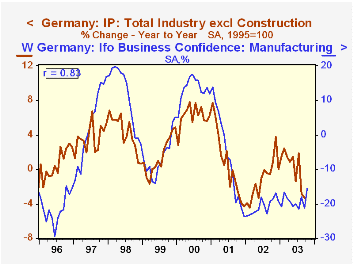 Global| Nov 07 2003
Global| Nov 07 2003German Industrial Production Sags, Despite Better "Business Climate"
Summary
Industrial production fell in Germany in September, down 1.2% after a 3.7% decline in August. Forecasters had looked for a GAIN of 1.6%. Chemicals, machinery and electrical equipment had the largest decreases in the month, while [...]

Industrial production fell in Germany in September, down 1.2% after a 3.7% decline in August. Forecasters had looked for a GAIN of 1.6%.
Chemicals, machinery and electrical equipment had the largest decreases in the month, while output of metals industries rebounded sharply following a big drop in August.
This performance in such a basic gauge as industrial production is disappointing in a country where industry is as important as in Germany. Other recent data suggested that Europe's largest economy would soon break out of a slowdown that had cut short the recovery from the 2001 recession. As noted here the other day, business confidence in West Germany has been rising sharply. The widely followed "Ifo" survey has shown notable improvement, and the latest PMI data also indicate that manufacturing companies judge that their activity has been picking up.
Two caveats might help explain this apparent contradiction. First, while the total Ifo climate index has been trending upward, the component of "confidence" in current conditions has been less exuberant. That index is more coincident with current production than the overall Ifo number, which includes expectations. As seen in the accompanying chart, the confidence index has been quite lackluster in recent months. Secondly, while the sentiment and PMI survey data have been on upward paths, they remain at relatively low levels. The Ifo climate index for all sectors was still down at -12.4 in September and "improved" in October to -7.8. The confidence sub-index for all industries remained well down in a range near -25 even through October. Manufacturing confidence, shown in the table below, is somewhat better, but still not even near zero. Further, the PMI for manufacturing was below the 50% breakeven threshold until September, and even the two latest readings in "growth" territory, September's 50.2 and October's 51.2, point to only modestly increasing activity. So continued weakness in actual industrial output might not be a complete surprise. The favorable trends in those auxiliary indicators give hope for stronger production to come, but it seems not to be here yet.
| Germany: Selected Industrial Indicators | Oct 2003 | Sept 2003 | Aug 2003 | Y/Y % |
2002 | 2001 | 2000 |
|---|---|---|---|---|---|---|---|
| Industrial Production, Total | N.A. | -1.2% | -3.7% | -3.6% | -1.3% | -0.1% | 5.3% |
| Industrial Production, excl Construction | N.A. | -1.5% | -3.5% | -3.3% | -1.2% | 0.5% | 6.2% |
| Ifo Business Climate: West Germany, Manufacturing (diffusion index) | 1.6 | -5.0 | -6.5 | -9.4 (Oct '02) | -8.2 | -10.1 | 11.1 |
| Ifo Business Confidence: West Germany, Manufacturing (diffusion index) | -15.6 | -21.2 | -18.1 | -18.6 (Oct '02) | -20.7 | -6.1 | 13.4 |
| PMI, German Manufacturing | 51.18 | 50.22 | 48.75 | 48.36 (Oct '02) | 48.16 | 47.46 | 57.15 |
Carol Stone, CBE
AuthorMore in Author Profile »Carol Stone, CBE came to Haver Analytics in 2003 following more than 35 years as a financial market economist at major Wall Street financial institutions, most especially Merrill Lynch and Nomura Securities. She had broad experience in analysis and forecasting of flow-of-funds accounts, the federal budget and Federal Reserve operations. At Nomura Securities, among other duties, she developed various indicator forecasting tools and edited a daily global publication produced in London and New York for readers in Tokyo. At Haver Analytics, Carol was a member of the Research Department, aiding database managers with research and documentation efforts, as well as posting commentary on select economic reports. In addition, she conducted Ways-of-the-World, a blog on economic issues for an Episcopal-Church-affiliated website, The Geranium Farm. During her career, Carol served as an officer of the Money Marketeers and the Downtown Economists Club. She had a PhD from NYU's Stern School of Business. She lived in Brooklyn, New York, and had a weekend home on Long Island.
More Economy in Brief
 Global| Feb 05 2026
Global| Feb 05 2026Charts of the Week: Balanced Policy, Resilient Data and AI Narratives
by:Andrew Cates





